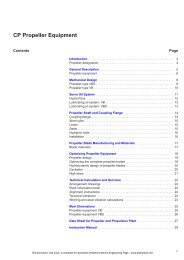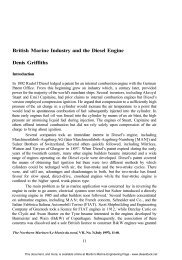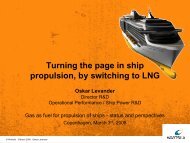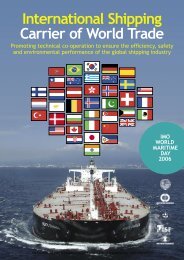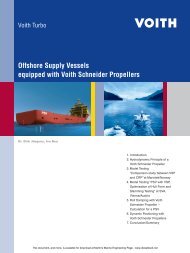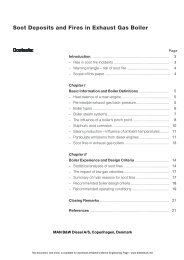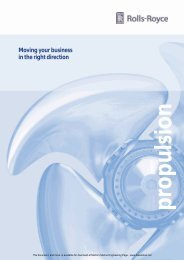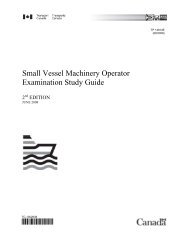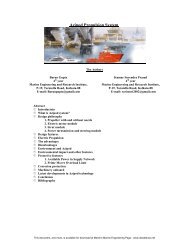Fire on Board the Liberian Passenger Ship Ecstasy, Miami, Florida ...
Fire on Board the Liberian Passenger Ship Ecstasy, Miami, Florida ...
Fire on Board the Liberian Passenger Ship Ecstasy, Miami, Florida ...
- No tags were found...
You also want an ePaper? Increase the reach of your titles
YUMPU automatically turns print PDFs into web optimized ePapers that Google loves.
Analysis 70 Marine Accident ReportThe Safety <strong>Board</strong> subsequently investigated <strong>the</strong> May 20, 2000, fire <strong>on</strong> board <strong>the</strong>Ne<strong>the</strong>rlands cruise ship Nieuw Amsterdam in which a passenger was forced to crawl <strong>on</strong> hishands and knees al<strong>on</strong>g <strong>the</strong> passageway outside his cabin due to <strong>the</strong> heavy smoke. As aresult of this and previous accident investigati<strong>on</strong>s, <strong>on</strong> July 11, 2000, <strong>the</strong> Safety <strong>Board</strong>elected to classify Safety Recommendati<strong>on</strong>s M-97-37 and -38 “Closed—Rec<strong>on</strong>sidered”and issue safety recommendati<strong>on</strong>s directly to <strong>the</strong> individual cruise ship companies servingNorth America. Safety Recommendati<strong>on</strong>s M-00-6 and -7 asked that cruise companies,without delay, install locally sounding alarms in accommodati<strong>on</strong>s areas to afford people<strong>the</strong> maximum available escape time during a fire.The Safety <strong>Board</strong> has been very pleased by <strong>the</strong> resp<strong>on</strong>se of <strong>the</strong> cruise ship industry.As of April 2001, 12 companies, representing about 85 percent of <strong>the</strong> North Americantrade, 49 had resp<strong>on</strong>ded to <strong>the</strong> Safety <strong>Board</strong> regarding <strong>the</strong> installati<strong>on</strong> of locally soundingalarms in both crew and passenger accommodati<strong>on</strong> areas. One company, CelebrityCruises, indicated that it had installed locally sounding alarms in accommodati<strong>on</strong> areas asrequested. The Safety <strong>Board</strong>, <strong>the</strong>refore, classified M-00-6 and -7 “Closed—AcceptableActi<strong>on</strong>” for Celebrity Cruises.Eleven companies resp<strong>on</strong>ded that <strong>the</strong>y supported <strong>the</strong> recommendati<strong>on</strong>s andintended to install locally sounding smoke alarms <strong>on</strong> <strong>the</strong>ir cruise ships. The elevencompanies included American Classic Voyages, Carnival Cruise Lines, Crystal Cruises,Disney Cruise Line, Holland-America Line/Westour, Inc., Norwegian Cruise Line,Princess Cruises, Radiss<strong>on</strong> Seven Seas Cruises, Renaissance Cruises, Royal CaribbeanInternati<strong>on</strong>al, and Seabourne Cruise Line (Cunard Cruise Lines). One resp<strong>on</strong>dent, DisneyCruise Line, indicated that, pending identificati<strong>on</strong> of <strong>the</strong> technology needed to modify itsexisting smoke detector systems, it had equipped its vessels with a system that triggers aspecial ring <strong>on</strong> <strong>the</strong> teleph<strong>on</strong>e in guest and crew cabins when smoke is detected. As a result,<strong>the</strong> Safety <strong>Board</strong> classified M-00-6 and -7 “Open—Acceptable Resp<strong>on</strong>se” for <strong>the</strong>secompanies. The Safety <strong>Board</strong> classified M-00-6 and -7 “Closed—No L<strong>on</strong>ger Applicable”for Premier Cruises because it is no l<strong>on</strong>ger in operati<strong>on</strong>.On January 22, 2001, <strong>the</strong> Safety <strong>Board</strong> requested informati<strong>on</strong> about <strong>the</strong> status ofM-00-6 and -7 to <strong>the</strong> following companies: Costa Cruise Lines, Orient Lines, RegalCruises, Royal Olympic Cruises, and Silver Sea Cruises. To date, <strong>the</strong> <strong>Board</strong> has yet toreceive a resp<strong>on</strong>se. The Safety <strong>Board</strong> has, <strong>the</strong>refore, classifies M-00-6 and -7 “Open—Unacceptable Resp<strong>on</strong>se” for <strong>the</strong>se five companies.On February 7, 2001, <strong>the</strong> ICCL issued a press release indicating that its memberlines had unanimously agreed to establish mandatory industry standards stipulating,am<strong>on</strong>g o<strong>the</strong>r requirements, that <strong>the</strong> vessels of each ICCL member have “smoke alarmsthat sound in all passenger and crew staterooms and adjacent corridors as well as <strong>on</strong> <strong>the</strong>bridge.” The ICCL release fur<strong>the</strong>r stated that, for most guidelines, member lines wouldintegrate <strong>the</strong> industry standards into <strong>the</strong>ir SMS to ensure compliance through internal andexternal audits.49 At <strong>the</strong> time of <strong>the</strong> accident, about 99 cruise ships operated out of North America. The 11 resp<strong>on</strong>dingcompanies owned 83 of <strong>the</strong> 99 vessels.



